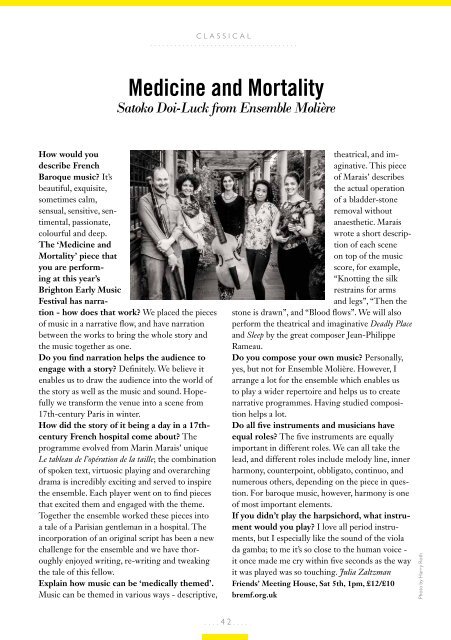Viva Brighton Issue #45 November 2016
You also want an ePaper? Increase the reach of your titles
YUMPU automatically turns print PDFs into web optimized ePapers that Google loves.
CLASSICAL<br />
.....................................<br />
Medicine and Mortality<br />
Satoko Doi-Luck from Ensemble Molière<br />
How would you<br />
describe French<br />
Baroque music? It’s<br />
beautiful, exquisite,<br />
sometimes calm,<br />
sensual, sensitive, sentimental,<br />
passionate,<br />
colourful and deep.<br />
The ‘Medicine and<br />
Mortality’ piece that<br />
you are performing<br />
at this year’s<br />
<strong>Brighton</strong> Early Music<br />
Festival has narration<br />
- how does that work? We placed the pieces<br />
of music in a narrative flow, and have narration<br />
between the works to bring the whole story and<br />
the music together as one.<br />
Do you find narration helps the audience to<br />
engage with a story? Definitely. We believe it<br />
enables us to draw the audience into the world of<br />
the story as well as the music and sound. Hopefully<br />
we transform the venue into a scene from<br />
17th-century Paris in winter.<br />
How did the story of it being a day in a 17thcentury<br />
French hospital come about? The<br />
programme evolved from Marin Marais’ unique<br />
Le tableau de l’opération de la taille; the combination<br />
of spoken text, virtuosic playing and overarching<br />
drama is incredibly exciting and served to inspire<br />
the ensemble. Each player went on to find pieces<br />
that excited them and engaged with the theme.<br />
Together the ensemble worked these pieces into<br />
a tale of a Parisian gentleman in a hospital. The<br />
incorporation of an original script has been a new<br />
challenge for the ensemble and we have thoroughly<br />
enjoyed writing, re-writing and tweaking<br />
the tale of this fellow.<br />
Explain how music can be ‘medically themed’.<br />
Music can be themed in various ways - descriptive,<br />
theatrical, and imaginative.<br />
This piece<br />
of Marais’ describes<br />
the actual operation<br />
of a bladder-stone<br />
removal without<br />
anaesthetic. Marais<br />
wrote a short description<br />
of each scene<br />
on top of the music<br />
score, for example,<br />
“Knotting the silk<br />
restrains for arms<br />
and legs”, “Then the<br />
stone is drawn”, and “Blood flows”. We will also<br />
perform the theatrical and imaginative Deadly Place<br />
and Sleep by the great composer Jean-Philippe<br />
Rameau.<br />
Do you compose your own music? Personally,<br />
yes, but not for Ensemble Molière. However, I<br />
arrange a lot for the ensemble which enables us<br />
to play a wider repertoire and helps us to create<br />
narrative programmes. Having studied composition<br />
helps a lot.<br />
Do all five instruments and musicians have<br />
equal roles? The five instruments are equally<br />
important in different roles. We can all take the<br />
lead, and different roles include melody line, inner<br />
harmony, counterpoint, obbligato, continuo, and<br />
numerous others, depending on the piece in question.<br />
For baroque music, however, harmony is one<br />
of most important elements.<br />
If you didn’t play the harpsichord, what instrument<br />
would you play? I love all period instruments,<br />
but I especially like the sound of the viola<br />
da gamba; to me it’s so close to the human voice -<br />
it once made me cry within five seconds as the way<br />
it was played was so touching. Julia Zaltzman<br />
Friends’ Meeting House, Sat 5th, 1pm, £12/£10<br />
bremf.org.uk<br />
Photo by Harry Roth<br />
....42....


















